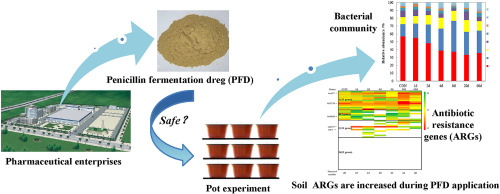Environmental Pollution ( IF 8.9 ) Pub Date : 2020-01-10 , DOI: 10.1016/j.envpol.2020.113956 Bing Wang 1 , Jianquan Yan 1 , Guomin Li 2 , Jian Zhang 1 , Lanhe Zhang 1 , Zheng Li 1 , Houhe Chen 3

|
Penicillin fermentation dreg (PFD) is a solid waste discharged by pharmaceutical enterprises in the fermentation production process. Due to the residual antibiotic of PFD, the risk of antibiotic resistance bacteria (ARB) generation should be considered in the disposal process. High-throughput quantitative PCR (HT-qPCR) and 16S rRNA gene sequencing were performed to investigate the effect of PFD on the dynamics of antibiotic resistance genes (ARGs) and bacterial community during a lab-scale soil experiment. After the application of PFD, the bacterial number and diversity showed an obvious decrease in the initial days. The abundances of Streptomyces and Bacillus, which are the most widespread predicted source phyla of ARGs, increased remarkably from 4.42% to 2.59%–22.97% and 21.35%. The increase of ARGs was observed during the PFD application and the ARGs carried by PFD itself contributed to the initiation of soil ARGs. The results of redundancy analysis (RDA) show that the shift in bacterial community induced by variation of penicillin content is the primary driver shaping ARGs compositions.
中文翻译:

青霉素发酵残渣的风险:土壤排放后抗生素抗性基因增加。
青霉素发酵渣(PFD)是制药企业在发酵生产过程中排放的固体废物。由于PFD中残留的抗生素,在处置过程中应考虑产生抗生素抗性细菌(ARB)的风险。在实验室规模的土壤实验中,进行了高通量定量PCR(HT-qPCR)和16S rRNA基因测序,以研究PFD对抗生素抗性基因(ARG)和细菌群落动态的影响。应用PFD后,最初几天细菌数量和多样性显示出明显下降。链霉菌和芽孢杆菌的丰度是最普遍的ARGs预测来源门,从4.42%显着增加到2.59%–22.97%和21.35%。在PFD施用期间观察到ARGs的增加,并且PFD自身携带的ARGs促进了土壤ARGs的产生。冗余分析(RDA)的结果表明,由青霉素含量变化引起的细菌群落转移是影响ARGs组成的主要驱动力。


























 京公网安备 11010802027423号
京公网安备 11010802027423号